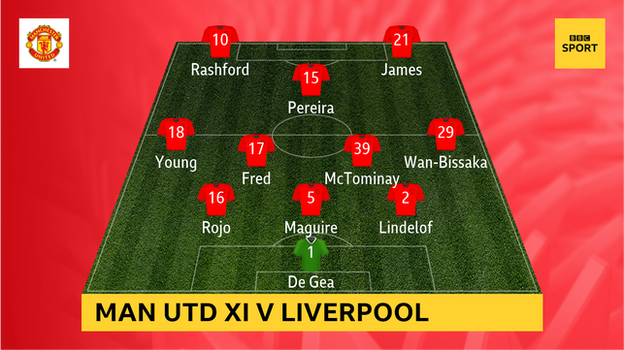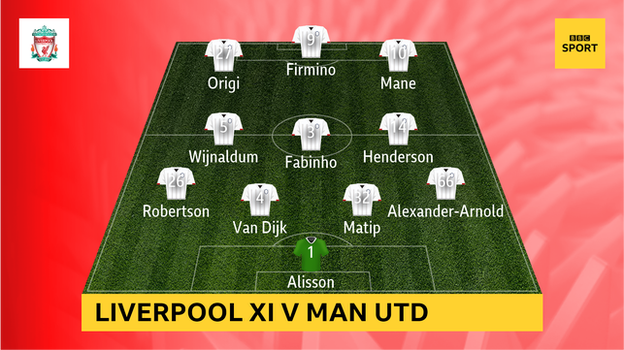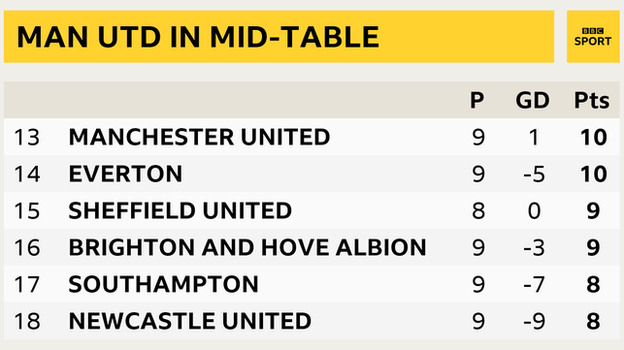Man Utd 1-1 Liverpool: How Ole Gunnar Solskjaer found a way to stop Reds - Darren Fletcher
- Published

Beating Liverpool would have been massive for Manchester United but it still felt as if Ole Gunnar Solskjaer's side produced a performance that can kick-start their season.
Of course United will be disappointed to concede an equaliser so late on having led for so long, but they should be pleased with the way they played in their 1-1 draw at Old Trafford.
Tactically, Solskjaer got it absolutely spot on and to come out and play like that against a top-class team such as Liverpool should give his side lots of confidence.
It was United's energy and intent up front that I really liked, and that is what I want to see more of. They played on the front foot, worked hard and had a clear plan.
Before the game, you probably would have seen a draw as a good result for United, but Liverpool ended up being the team delighted with a point.
Man Utd 1-1 Liverpool: Jurgen Klopp takes issue with tackle on Divock Origi
Solskjaer found a plan that worked
I was not surprised with how well United played, because they had a point to prove.
Their recent results had been disappointing, and they were playing Liverpool at home, after an international break. The players and fans were always going to be up for it.
I've played in this fixture myself and the minimum expected by supporters of any United player in a game like this is a high level of aggression and tenacity - getting up to the ball, and being hard to beat.
Sometimes, it is just about running around. That might sound like a throwaway comment but if you can do that early on to get the fans behind you and combine that with a good tactical plan, it carries you a long way.
On Sunday, United did all of that.
They had the required level of effort and performance, and Solskjaer came up with a game plan not just to stop Liverpool, but to capitalise on where he felt they had a weakness.

He did that by setting up with three at the back and two wing-backs, and also used two forwards, Marcus Rashford and Daniel James, who split and played really high and wide.
If Liverpool's full-backs went forward, as they usually try to do, it left their centre-backs isolated when Rashford and James ran down the channels. United were always looking to use their pace with quick balls forward.
Some people are obsessed with seeing sides pass the ball and keeping possession but from the start, those quick balls saw United cause Liverpool problems when Rashford and James span off their men down either side, and turned their defence.
As I said to Solskjaer when he came on MOTD2 to speak to us afterwards, that is a tactic United used in my day. It creates a tempo in the stadium, and the opposition don't like it.
Danny Murphy believes Man Utd's performance against Liverpool is something to 'build on'
We always used to play like that early in games - get the ball forward and turn teams. That gives you a foothold, then you get in the opposition half, and then you can play your football.
United did that brilliantly in the first half on Sunday, and Liverpool really struggled to deal with it.
Liverpool wear down Man Utd in the end
Nothing was working for Jurgen Klopp's side before the break, but he changed that in the second half when they moved from their usual 4-3-3 to a 4-3-2-1 formation.
The idea was to nullify United's wing-backs and pin them back - for example, Jordan Henderson came out and played high and wide on their right to occupy Ashley Young and try to free up Trent Alexander-Arnold so he could get more crosses in.
It was that change of tactics that eventually paid off down the other flank, when Liverpool left-back Andy Robertson put in the ball for Adam Lallana's equaliser.
It had felt as if Liverpool were really struggling to break United down but, eventually, they wore them out.

Klopp made three changes in the second half - Alex Oxlade-Chamberlain replaced Divock Origi (60 mins), Adam Lallana for Jordan Henderson (71) and Naby Keita for Georginio Wijnaldum (82)
They worked them side to side and, the longer you do that for, the more you back yourselves to get a chance - which is exactly what happened.
First, there were some tired legs from Aaron Wan-Bissaka that allowed the cross to come in. He was marking Alex Oxlade-Chamberlain but could he have got out to Robertson quicker?
Then there was a little bit of a mix-up between Ashley Young and Marcos Rojo over who was picking up Adam Lallana. Young had him initially, but passed him over to Rojo and they ended up getting confused.
Roberto Firmino deserves credit for the way he ran past the first United centre-half and dummied the cross, because that caused problems for every defender behind him.
And of course Lallana did well to get in there for the finish too, but United will still see that goal as an avoidable one, especially after all the good defensive work they had done.
Man Utd have options going forward

Despite the late disappointment, United's 3-4-1-2 formation clearly worked, so Solskjaer now knows they are comfortable in that shape.
As he said afterwards, he has got a lot of centre-backs - and this is obviously a way to use them.
It is also a formation that allows Andreas Pereira to play as an out-and-out number 10, which is definitely his best position.
Pereira was not only effective on the ball, with his runs and passing forward, but also his work off it. The way he was closing people down was a big part of United's success.
Further forward, we now know Rashford and James are effective as split strikers too.
United have had lots of injuries this season, but it feels like they have particularly missed Anthony Martial while he has been out, because he was going to play as their number nine this season.
Man Utd 1-1 Liverpool: Solskjaer praises referee Atkinson
I think Solskjaer wanted to play Martial as his main striker and play Rashford off him down the left where he has space to run, and where he can drift inside. Daniel James seems better cutting in from wide areas too.
With Martial out, Rashford has played in a few different positions and he has not really settled.
I think we will see the best of Rashford when Martial is back fit, and they can play together regularly as a three with James, but this also seems like a system that works for him.
United have been accused of being predictable and one-dimensional going forward at times this season, but they have got another option in attack now.
Darren Fletcher was speaking to BBC Sport's Chris Bevan.